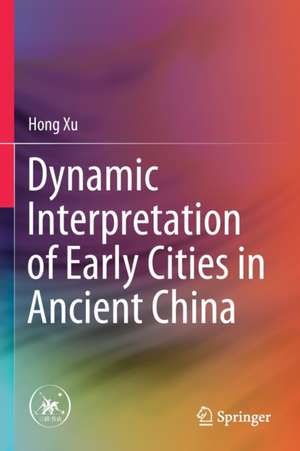Dynamic Interpretation of Early Cities in Ancient China
Autor Hong Xuen Limba Engleză Paperback – 16 iun 2022
| Toate formatele și edițiile | Preț | Express |
|---|---|---|
| Paperback (1) | 693.90 lei 6-8 săpt. | |
| Springer Nature Singapore – 16 iun 2022 | 693.90 lei 6-8 săpt. | |
| Hardback (1) | 700.10 lei 6-8 săpt. | |
| Springer Nature Singapore – 15 iun 2021 | 700.10 lei 6-8 săpt. |
Preț: 693.90 lei
Preț vechi: 816.35 lei
-15% Nou
Puncte Express: 1041
Preț estimativ în valută:
132.78€ • 138.36$ • 109.94£
132.78€ • 138.36$ • 109.94£
Carte tipărită la comandă
Livrare economică 03-17 aprilie
Preluare comenzi: 021 569.72.76
Specificații
ISBN-13: 9789811623899
ISBN-10: 9811623899
Ilustrații: XV, 218 p. 127 illus., 23 illus. in color.
Dimensiuni: 155 x 235 mm
Greutate: 0.34 kg
Ediția:1st ed. 2021
Editura: Springer Nature Singapore
Colecția Springer
Locul publicării:Singapore, Singapore
ISBN-10: 9811623899
Ilustrații: XV, 218 p. 127 illus., 23 illus. in color.
Dimensiuni: 155 x 235 mm
Greutate: 0.34 kg
Ediția:1st ed. 2021
Editura: Springer Nature Singapore
Colecția Springer
Locul publicării:Singapore, Singapore
Cuprins
Introduction.- I. The time after the Wei and Jin dynasties – City wall and grid-pattern.- II. The capital cities of the Qin and Han dynasties and their environs – The domineering empires.- III. Times of Unrest – The city of the Eastern Zhou dynasty.- IV. Three Generations of Capitals.- Conclusion: The Great Central Axis.
Notă biografică
Prof. Hong Xu is the researcher of archaeological institute of the Chinese Academy of Social Sciences. He is the director of Xiashangzhou Research Laboratory of the archaeological institute in the Chinese Academy of Social Sciences and the team leader of the archaeological team in Erlitou site. During his Ph.D phase, His Ph.D supervisor is the famous Chinese archaeologist Mr.Xu Pingfang(徐苹芳), and he has visited many countries and regions to learn. As a researcher, His main research direction includes the archaeology of Xia, Shang and Zhou Dynasty, the archaeology of Ancient City in China, and he concerns about the formation of Chinese civilization and early country on archaeological studies.His most important work are An Archaeological Study of the Cities in the Pre - Qin Period, The Earliest China, Dynamic Interpretation of Early Cities in Ancient China, and so on.
Textul de pe ultima copertă
This book offers an archaeological study on China’s ancient capitals. Using abundant illustrations of ancient capital sites, it verifies the archaeological discoveries with documentary records. The author introduces the dynamical interpretation of each ancient capital to the interpretation of the entire development history of China's ancient capitals. The book points out that for most of the almost 2000 years from the earliest Erlitou (二里头)to the Ye city (邺城), there was an era where ancient capitals didn’t have outer enclosures due to factors such as the strong national power, the military and diplomatic advantage, the complexity of the residents, and the natural conditions. Thus an era of “the huge ancient capitals without guards” lasting for over 1000 years formed. The concept that “China’s ancient capitals don’t have outer enclosures” presented in the book questions the traditional view that “every settlement has walled enclosures”. Combining science with theory, it offers researchers of history a clear understanding of the development process of China’s ancient capitals.
Caracteristici
Shows the evolution process of Chinese ancient capitals Uses detailed illustrations of archaeology to confirm the historical facts Questions the traditional view that “every settlement has walled enclosures”
